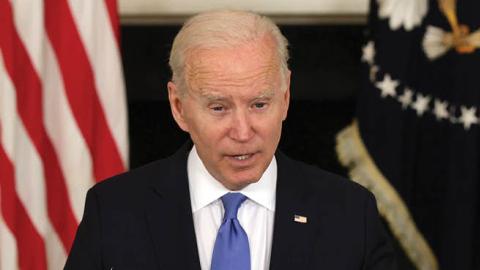As the G7 ministerial meetings opened in London this week, U.S. Secretary of State Antony Blinken called for dealing with China from a “position of strength.” Fair enough. But it remains unclear how committed the Biden administration is to projecting strength to the world — and President Biden’s address to Congress last week provided cause for concern on this front.
In his first address to Congress, President Biden struck a bold pose before a depleted House chamber, including on issues of G7 concern. He proudly recalled warning Chairman Xi Jinping that America can’t “remain silent when basic human rights are violated” by China. He vowed to confront China’s unfair trade practices and intellectual-property theft. And he cited his “direct” response to Russian aggressions, another G7 concern.
But what the president didn’t say was, sadly, more telling: He failed to condemn the CCP deceptions that escalated COVID-19’s deadly toll on America and the rest of the world.
During his speech, the president pointedly warned that America “won’t ignore what our own intelligence agencies have determined.” But have our intelligence agencies not determined that China covered up COVID-19’s grave dangers, even as it welcomed foreign visitors and allowed its own citizens to travel abroad? Did our intelligence agencies not report that the CCP silenced witnesses, destroyed evidence, and subverted the WHO while the disease spread worldwide? Have our intelligence agencies not asserted that while the CCP engaged in these deceptions — and shamelessly accused its critics of racism — it bought up medical supplies other countries would later need?
How is it that the president can condemn China’s domestic repression and economic abuses, but not the gross wrongs that killed so many and fed the pandemic “abyss” his speech lamented? The president’s recent reticence is not an aberration. At the State Department, too, he had listed Chinese wrongs that he vowed to “directly” confront. But did he call China to task for exacerbating COVID’s worldwide devastation? Not so much.
These are not callous omissions. President Biden has repeatedly evoked COVID’s human costs since the pandemic began. Secretary Blinken, too, knows the pain of our COVID-related losses and those of our allies. The question is whether the administration will begin, in London, the essential work the president failed to mention before Congress and the American people: calling out the CCP’s malfeasance and shaping an international response that imposes real costs for it in the interests of fairness.
Perhaps this has already been the subject of behind-the-scenes diplomacy. But there is another possibility: After 100 days in office, the administration may still lack a forceful policy to address China’s COVID misdeeds. If that’s the case, this G7 may pass without a real show of strength and resolve. And so may the next one.
The danger of failing to hold China to account should be obvious. COVID-19 showed our most ruthless foes how to cripple America and our allies and swell our debt. Chinese recklessness may have loosed COVID in Wuhan, but a calculating China has reaped the rewards from the cover-up that sped its spread abroad. Now, in a distracted world, China proudly touts the efficiency of its surveillance state while continuing to build up its military and pursue its ambitious efforts to gain a strategic advantage along the Asian littoral.
Protecting the future from such grave, biological threats will be harder if the CCP pays no price for a cover-up that helped spread the deadly coronavirus into the world. Perhaps American reticence might have been defended as tactical while we lacked supplies and vaccines; but, as the president asserts, we are now well on our way back to something approaching normality.
Regrettably, the CCP may count on the world shying away from this issue. China has gutted Hong Kong, grievously wronged Uyghur Muslims in Xinjiang, defied international tribunals, militarized the South China Sea, stolen intellectual property, and subverted markets — all without suffering consequences that outweigh its gains. When China threatens Taiwan, the U.S. redoubles its rhetorical support for its ally while cutting real defense spending. When Australia raises questions about China’s role, China punishes it.
No wonder, then, that China has recently taken a more aggressive stance with U.S. diplomats, publicly chiding American arrogance and hypocrisy. China has eliminated poverty, while racism and deprivation mark America, CCP diplomats claimed in March. They even went so far as to argue that the world sees no model in our violent and self-destructive state, while the Chinese model of governance will be the foundation of a U.N.-based “shared future for humanity.”
The Biden administration might remind the G7 that no responsible nation would have responded to COVID as the CCP did. If the “shared future” Xi envisions is anything like the recent past, it will offer other nations no warning, transparency, apology, or recompense for the spread of deadly diseases from China to their shores — and it would be good to hear President Biden say so. But will he, or does he intend that the CCP should skate for its COVID deceptions? If he does, his warning to Xi that American will defend its interests “across the board,” will ring hollow. The world understands that China’s leaders had a hand in furthering the greatest civilian harm our nation, and many of our allies, have endured in a century. Our friends and foes alike are watching.
Before Congress, President Biden boasted that America has returned to lead the world. To do that, we need to speak out forthrightly, to present plans to protect the country, and to muster a show of will to lead our allies. The world’s democracies need to hold the CCP accountable one way or another. Americans, the president said in his speech, haven’t flinched during this past year’s crisis. But perhaps he has.
Read in National Review

















